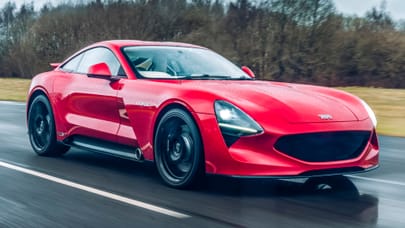
A new report says the car industry will overshoot its 2050 CO2 target by 75 per cent
Unless urgent action is taken, the automotive industry won't meet the Paris 2015 agreement
The day the UK got a new government department to oversee Energy Security and Net Zero, a new international report was issued that outlines huge changes the authors say are necessary to achieve zero CO2 for cars.
The report is issued by Polestar and Rivian and compiled by management consultant Kearney, using public data.
The report looks at what will be needed for cars to play their proportional part in reducing CO2 emissions sufficiently that the world doesn't exceed 1.5-degree warming. That's the temperature change signed into an international treaty in Paris in 2015, a threshold the parties agreed would be a gateway to widespread climate chaos.
That treaty assumes that to prevent an overshoot of the 1.5-degree target, the world has a 'budget' of 500 gigatonnes of CO2-equivalent remaining to emit before 2050. Cars are responsible – via their manufacture and use – for 15 per cent of global CO2 at the moment, so their budget remaining is 15 per cent of that 500Gt, or 80Gt.
At the moment, cars emit about 5.5Gt a year, so we're on course to use up all the budget by 2035 unless we make major changes. On that same trajectory, by 2050 cars would have emitted nearly 75 per cent over their carbon budget.
Of course zero tailpipe emissions, via a complete change to electric cars, isn't enough. The report concludes that there would also have to be a total decarbonisation of the electricity grid that powers the cars. At the moment the world's electricity is around 40 per cent fossil-free.
But even that's not enough to avoid overshooting the 11Gt budget before 2050.
A third lever would need to be pulled too. The report says that to stay within budget we need to arrive at car manufacture, including extracting the raw materials, that's net-zero carbon. That would be achieved by scaling up fossil-free iron and aluminium processes, together with green-electrified mining. Most of all, an increase of recycling would help.
Battery manufacture means EVs are presently somewhat more carbon-intensive to build than combustion cars, although they offset that after two to three years' driving. The report expects batteries will get smaller as charging infrastructure improves. That would also make EVs cheaper versus combustion cars. (It's also quite brave for Rivian to say, given it sells SUVs with up to 180kWh batteries.)
Plainly all this is a colossal challenge. But it's pretty hard to argue that the car industry – together with those that supply its electricity and its components – can shirk doing its share.
Top Gear
Newsletter
Thank you for subscribing to our newsletter. Look out for your regular round-up of news, reviews and offers in your inbox.
Get all the latest news, reviews and exclusives, direct to your inbox.
There will need to be pan-industry co-operation, and the report sponsors have already set up a new forum. There will also need to be pressure from car buyers and investors as well as legislators. Informed buyers acting together, and also voting for governments to act, can make corporations change course remarkably quickly.
Trending this week
- Car Review
BMW iX3








